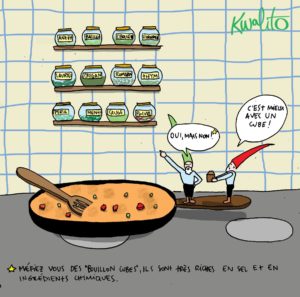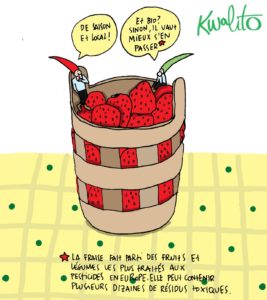Homemade superfoods protein powder
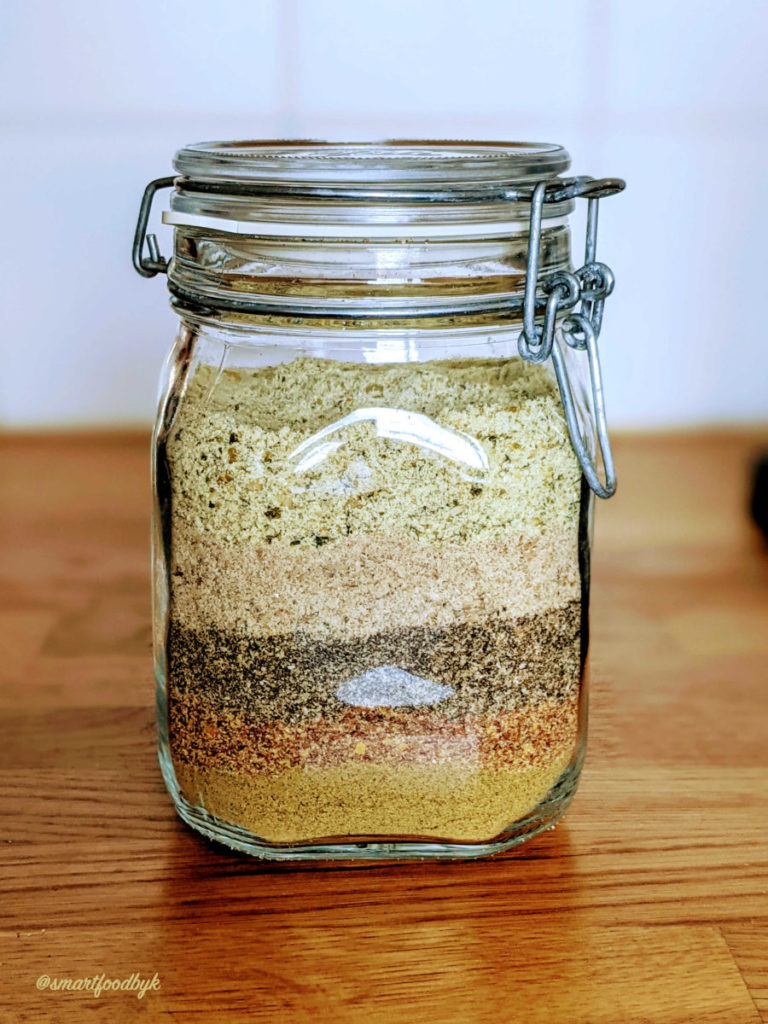
I have been asked time and time again to give advice on protein powder product or brand to buy. My answer would most of the time be: just eat a variety of the 5 whole food groups daily (vegetables, pulses/legumes, grains, fruit and in much less quantity nuts and seeds) and do not worry about getting enough protein, you will get enough. There are however times in life when you feel that your body needs more protein. When, for example, you want to build the muscles, or when you are performing an intensive physical or sports activity or recovering from illness. Or maybe when you get too busy in your life to keep close attention to what you eat and you just need a quick fix for a period of time.
Whatever your reason may be, there are many really good organic brands out there for you to chose from. I, however, have to be honest with you. I have never bought a protein powder in my life so I could only quote brands that I see my fellow vegan bloggers recommend. Consequently, you will not find any brand names in this post, because I only recommend what I have myself tried. But wait, don’t go, you WILL learn how to make your own, super simple, protein powder mix, that will not only be your protein power plant but also will give you so much more health benefits. Just continue reading 🙂
5-seed protein powder power plant
All 5 of these seeds are superfoods although only one of them is fancy enough today to have the official title 😉 The fancy one is CHIA and the other four are HEMP, LIN, SUNFLOWER and PUMPKIN seeds.
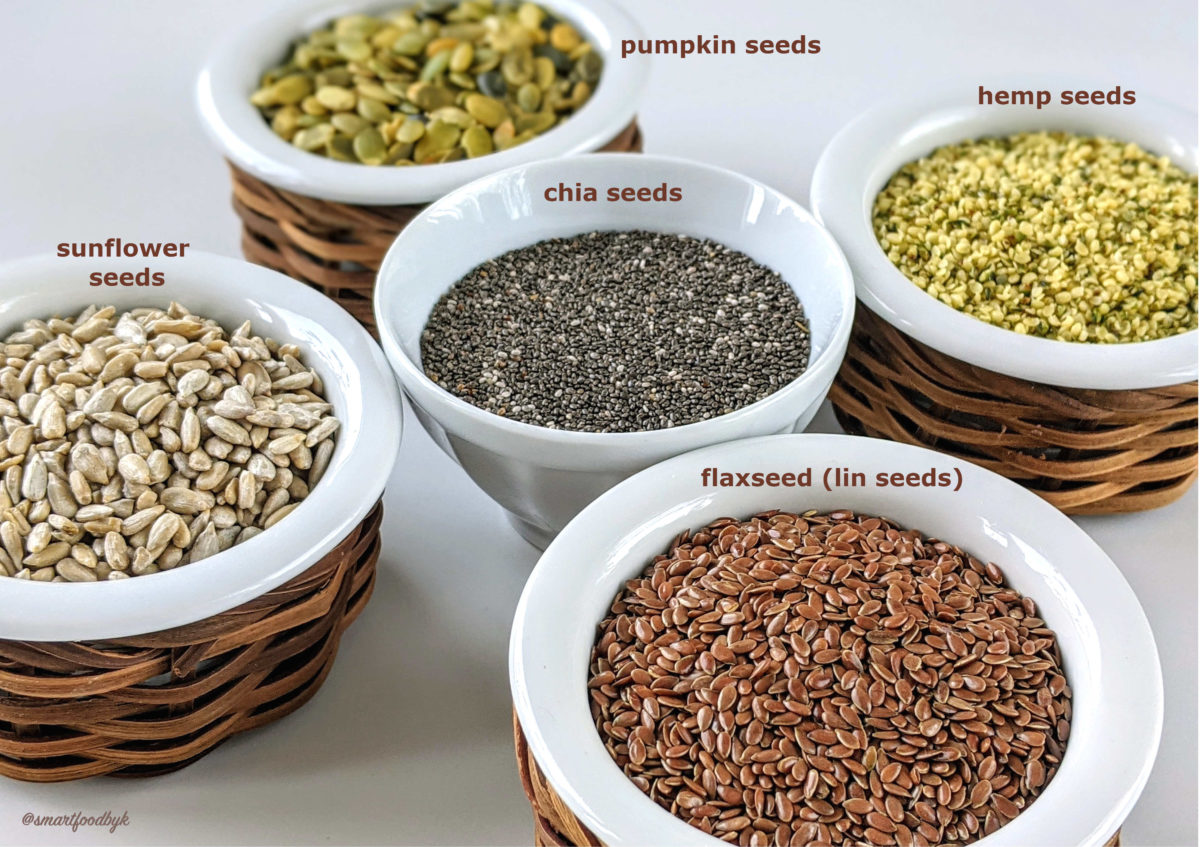
100g of Chia seeds contain 17g of protein.
100g of Lin seeds (flaxseed) contain 18g of protein.
100g of Sunflower seeds contain 21g of protein.
100g of Pumpkin seeds contain 21g of protein.
100g of Hemp seeds contain 34g of protein that is considered complete. It contains all 9 essential amino-acids that our body cannot make (as a result, they must come from food). Quinoa is another example of plant-based complete protein source.
Impressive isn’t it? And their generosity does not stop with protein. These seeds contain many other nutrients exceptionally beneficial for our health.
Hemp seeds
Hemp seeds are the seeds of the hemp plant, Cannabis sativa. They are from the same species as cannabis (marijuana) but a different variety.
Exceptionally rich in two essential fatty acids Omega 3 ALA (alpha-linolenic acid) and Omega 6 linoleic acid, they also contain GLA (gamma-linoleic acid). Their omega-6 to omega-3 ration is 3:1, which is considered as the optimal range. GLA helps regulate hormonal imballance and reduce the symptoms of PMS and menopause.
Hemp seeds are also a great source of vitamin E (powerful antioxidant), vitamins B and minerals, such as phosphorus, potassium, sodium, magnesium, sulfur, calcium, iron and zinc. They help boost immune system, regulate metabolism and reduce inflammation. Studies show that the CBD oil could have anti-rheumatic effects. It sure helps my mum relieve her arthritis pains.
Their CBD (cannabidiol) content may help with neurological conditions like Alzheimer’s, Parkinson’s, multiple sclerosis and childhood seizure disorders.
They contain approximately 510 calories per 100g.
You can eat them raw, roasted or cooked added to your soups, salads, breakfast cereals, smoothies.
Chia seeds
They are loaded with nutrients while being very low in calories (approximately 340 calories per 100g). Bursting with minerals: calcium, manganese, magnesium, phosphorus, potassium, vitamins B1, B2 and B3, they also contain a good amount Omega 3 (more than salmon, for example). The reason why they are low in calories is because almost all of their carbs content is fiber (40g per 100g of seeds) that is so essential to our gut health. Chia seeds may help reduce the risk of heart disease, blood sugar levels and chronic inflammation.
It is important to note that the Omega 3 chia contains is ALA (alpha-linolenic acid). “ALA needs to be converted into the active forms EPA (eicosapentaenoic acid) and DHA (docosahexaenoic acid) before your body can use it.” (quotation from a medical source). Humans, however are not very efficient at converting AHA into these active forms. Because chia does not provide any DHA (the most important Omega 3 fat), some experts consider them a lower-quality Omega 3 source.
Chia seeds are super easy to prepare and are perfect for your porridges, smoothies or chia puddings.
Lin seeds
Lin seeds (or flaxseed) are one of the oldest crops, grown since the beginning of civilization.
There are two kinds of lin seeds, golden and brown and both are equally nutritious. They contain approximately 500 calories per 100g. Lin seeds are the best plant source of ALA Omega 3 fatty acid. Although some experts consider ALA a lower quality fatty acid, studies show that they have heart health benefits comparable to EPA and DHA. Lin seeds are also rich in lignans, plant compounds that have antioxidant and estrogen properties. Lignans help lower the risk of cancer, especially breast (particularly postmenopausal women) and prostate cancer. They help lower blood pressure and cholesterol and control blood sugar.
Flax seed is commonly used in vegan and plant-based diets as an egg substitute in pastries. Replace 1 egg by a mix of 1 tbsp of ground flaxseed and 2-3 tbsp of water. You can also sprinkle them on your bread and pastries before baking.
Pumpkin seeds
Pumpkin seeds are rich in minerals: phosphorus, magnesium, manganese, iron, zinc, copper, potassium, vitamins K and B6 and Omega 6 fatty acids. They also contain anti-oxidants like carotenoids and vitamin E that fight harmful free-radicals and protect from inflammations like arthritis. They help improve heart and prostate health and provide protection against certain cancers like the breast cancer. As a rich source of zinc they may improve the sperm quality, too.
They Contain approximately 520 calories per 100g.
In many countries, they are a popular snack that people eat either raw or roasted. You can add them to your salads and breakfast cereals and sprinkle them on your soups (and potages) and pastries before baking.
Sunflower seeds
Sunflower seeds are especially high in vitamin E and selenium, as well as phenolic acids and flavonoids. These all function as antioxidants that fight free radicals and protect our bodies from chronic diseases. Sunflower seeds are also rich in unsaturated fatty acids, especially linoleic acid that help lower the blood pressure and cholesterol. Studies also suggest that adding sunflower seeds to foods like bread, for example, may help decrease carbs’ effect on your blood sugar.
They however contain more calories than the other four seeds, 610 calories per 100g.
Same as pumpkin seeds, you can add them to your salads and breakfast cereals. Or sprinkle them on your soups (and potages) and pastries before baking.
Although rare, allergies to sunflower seeds may occur. Reactions may include asthma, mouth swelling, hay fever, skin rashes, vomiting…
Protein powder mix
This just cannot be simpler! Take 100g of each and grind them to powder in your blender or food processor. Transfer them to an air tight glass jar, and mix them together by shaking the jar. Done!
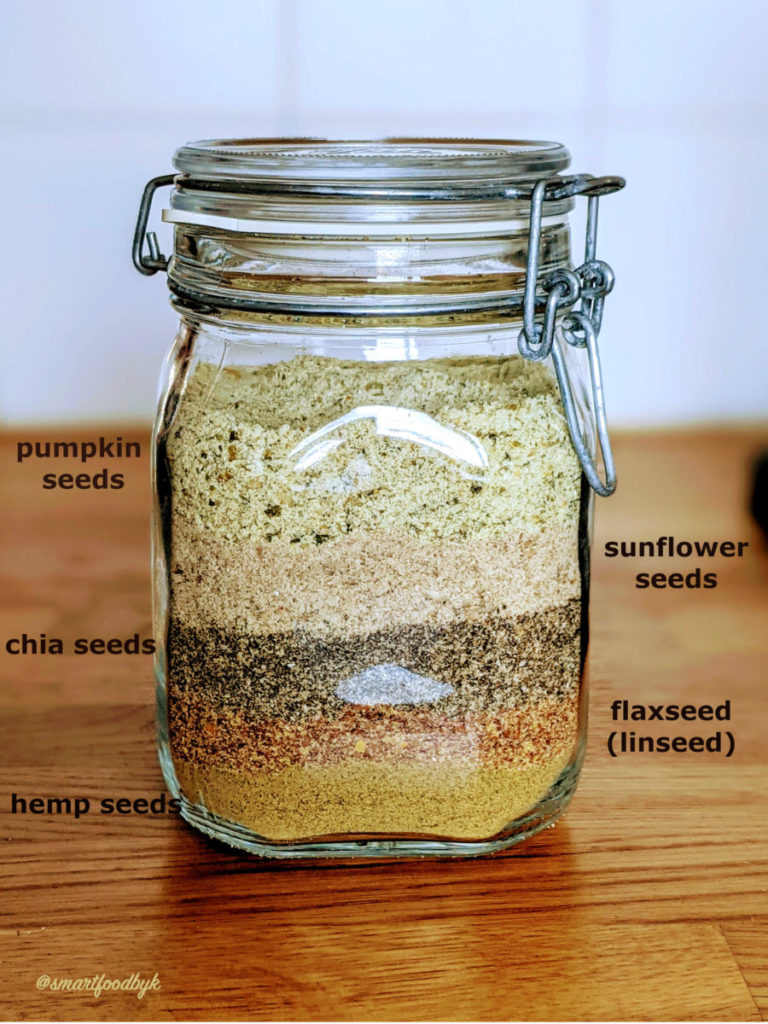
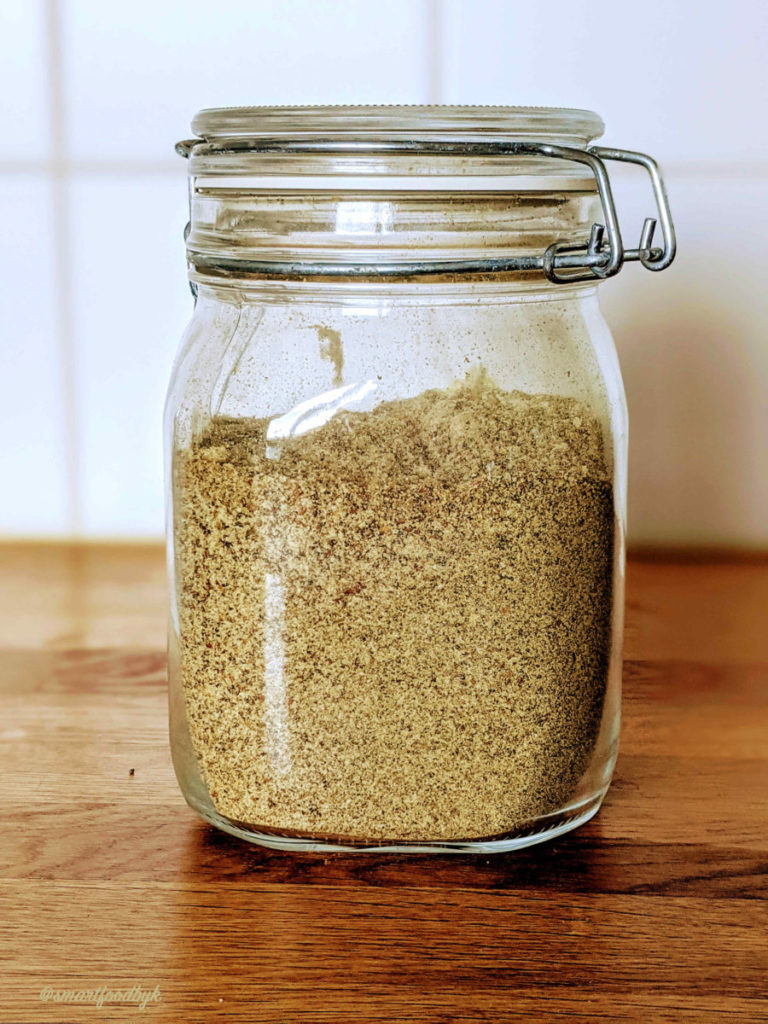
I would recommend grinding the different seeds separately because they have different size and consistency. If you grind them together some of them may already start turning into a buttery paste while others might not be reduced to powder yet.
Add a tablespoonful (or more if needed) to your smoothies, shakes, soups, sauces, salad dressing…
Stay healthy, stay happy 🙂



